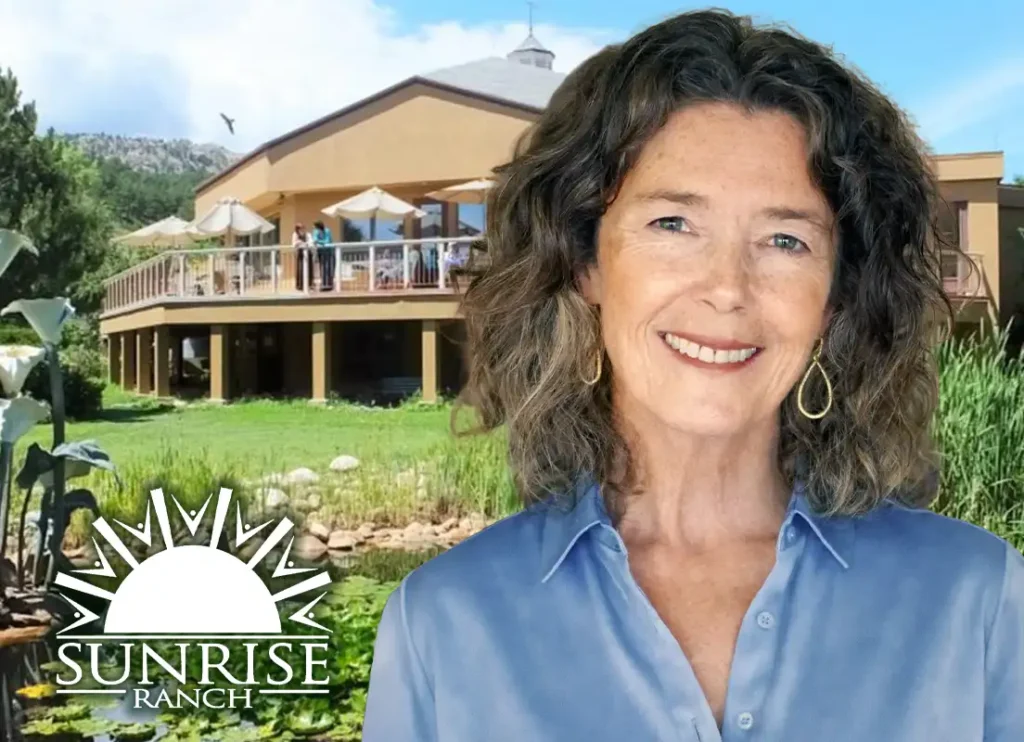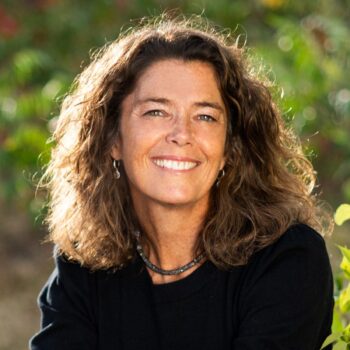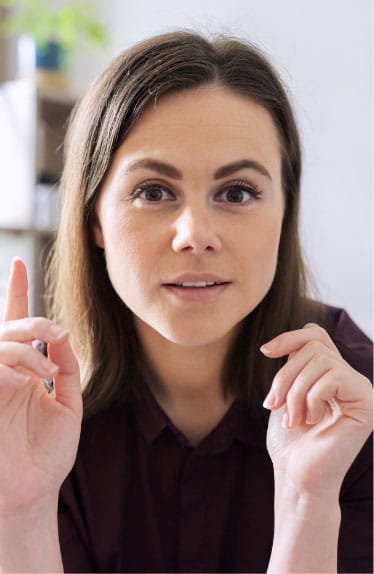
Attachment & Trauma Mastery Training

Liz George, Ph.D. is a Licensed Clinical Psychologist in Boulder, Colorado, and a certified Somatic Experiencing® and DARe practitioner. With training in Brainspotting and Somatic Resilience and Regulation developmental touch work, she brings over two decades of experience integrating body-based and relational approaches to trauma healing. Liz is also a Certified Mindfulness Instructor and a SoulCollage® facilitator using deepening mindfulness and creative processes for healing. Finally, Liz is a certified Ketamine Assisted Psychotherapy (KAP) provider. She brings her work with somatic therapy, attachment, mindfulness, and support for non ordinary and mystical states to her therapeutic application and training helping individuals and communities heal from trauma and reconnect with resilience, compassion, and the natural world.
Enrollment Closes:
Share This Event
Cancellation & Refund Policy
Full refunds will be given in the rare event that the workshop is canceled. Enrollment for this event is limited to 75 online participants and 50 in-person participants. A refund––less $100 administrative fee––will be issued if a participant chooses to withdraw 30 days prior to the workshop date. After Day 30–– and up to 2 weeks prior to the workshop date––50% of the registration fee will be refunded. Please note that DARe Certificate Program Prepayment Plans are not eligible for refunds (you may simply reschedule your training).
Summary
This foundational training in the Dynamic Attachment Repatterning experience (DARe) series introduces the core attachment styles—helping you understand the origins and dynamics of early attachment wounds, and the pathways toward secure functioning.
Whether you attend in person or virtually, you’ll explore how early attachment patterns shape adult relationships and learn somatic, relational, and experiential methods to foster healing and resilience.
You’ll gain essential skills to help yourself and your clients develop deeper connection, meaning, joy, and intimacy in adult relationships by working to break unhealthy patterns, restore secure attachment, and heal early attachment wounds.
What You’ll Learn
- How to identify and distinguish Secure, Avoidant, Ambivalent, and Disorganized attachment adaptations
- Somatic and experiential methods to support regulation and secure connection
- How over-coupling dynamics in early “family of origin” attachment patterns affect adult relationships and behaviors
- Ways to design and facilitate corrective experiences for early attachment wounds
- Tools for cultivating presence, attunement, and relational safety in your work
- A framework for integrating embodiment and neurobiological awareness effectively in clinical settings
Live DARe trainings is a rare opportunity to experience this work in person—especially under the guidance of experienced facilitator Dr. Liz George. The tranquil setting of Sunrise Ranch, Colorado offers an ideal environment for restorative practice, reflection, and community connection. For those who are able, we’d love for you to join us. Attendance is limited. See below for more details about the in-person event.
For those joining virtually, you’ll receive full access to the live training sessions, demonstrations, and Q&As through our interactive online platform. Learn more about DARe Online Workshops or find out how to join the DARe Certificate Program.
This training is being co-taught by Kristin Burns
 Kristin Burns, LCSW, SEP is a Licensed Clinical Social Worker, Somatic Experiencing® Practitioner, and DARe Lead Assistant with over 30 years of experience integrating Eastern and Western healing traditions. Her work bridges somatic, relational, and spiritual modalities to support wholeness, regulation, and secure connection. Kristin specializes in developmental and pre-/perinatal trauma, grief transformation, and embodied movement practices. A longtime yoga teacher and facilitator, she is passionate about making somatic and attachment-informed approaches accessible to all. Kristin brings grounded presence, compassion, and a deep respect for the body’s innate wisdom to every learning environment she leads.
Kristin Burns, LCSW, SEP is a Licensed Clinical Social Worker, Somatic Experiencing® Practitioner, and DARe Lead Assistant with over 30 years of experience integrating Eastern and Western healing traditions. Her work bridges somatic, relational, and spiritual modalities to support wholeness, regulation, and secure connection. Kristin specializes in developmental and pre-/perinatal trauma, grief transformation, and embodied movement practices. A longtime yoga teacher and facilitator, she is passionate about making somatic and attachment-informed approaches accessible to all. Kristin brings grounded presence, compassion, and a deep respect for the body’s innate wisdom to every learning environment she leads.
Virtual Attendance—Streaming Live Online
Join DARe 1: Fundamentals of Attachment Styles from anywhere in the world through our live, interactive online platform.
Virtual attendance allows you to experience the full course—complete with live-streaming lectures, demonstrations, Q&A sessions, and small-group integration—without the need to travel. You’ll learn directly from Dr. Liz George and Kristin Burns, LCSW, gaining a deep understanding of how early attachment patterns shape adult relationships and how to foster secure connection through somatic and relational repair.
Online participants will:
- Attend all live lectures, demonstrations, and Q&A sessions in real time
- Participate in facilitated online breakout groups for reflection and experiential learning
- Access digital course materials and post-session replays for continued study
- Qualify for up to 12 CE credit hours (see CE section below for details)
- Connect with a supportive community of colleagues and learners across the globe
The online format preserves DARe’s signature sense of safety and connection, offering opportunities to witness live demonstrations and engage in guided exercises from the comfort of your own environment.
The virtual training runs May 15–18, 2026, 9:30 am - 5:30 pm MT.
In-Person Experience
Our online DARe trainings are known for providing a safe, supportive atmosphere for learning, practicing, and processing.
This year, we’re bringing that same restorative, experiential energy live and in person—creating an opportunity to deepen connection, embodiment, and integration of the course material.
The in-person DARe 1 training takes place at Sunrise Ranch, a serene retreat center nestled in the foothills of the Rocky Mountains near Loveland, Colorado. Surrounded by open sky, gardens, and walking trails, participants will spend five days in community with fellow learners—balancing rich educational content with grounding embodiment practices, group exercises, and time for personal reflection.
You’ll enjoy:
- Morning embodiment and movement practices led by Kristin Burns to support nervous-system regulation and presence
- Live lectures and demonstrations with Dr. Liz George, integrating theory, somatic awareness, and experiential learning
- Small-group practice sessions and daily resource groups for peer support and integration
- Nutritious, locally sourced meals prepared by the Sunrise Ranch culinary team (with accommodations for dietary needs)
- Optional evening experiences, including SoulCollage®, a fire-circle gathering (weather permitting), and quiet reflection in nature
- Comfortable shared or private lodging, with access to trails, gardens, labyrinth, hot tub, sauna and contemplative outdoor spaces
Each day blends didactic learning, somatic exploration, and guided connection, supporting both professional development and personal restoration.
The schedule allows space for rest, reflection, and community connection, with meals and accommodations provided on site.
Accommodation and travel reservations are separate from course registration and must be booked directly through Sunrise Ranch.
Participants are required to stay on-site for the duration of the training to support safety, regulation, and group cohesion. Lodging includes three daily meals prepared by the Sunrise Ranch culinary team, with options for dietary needs.
You’ll receive detailed booking instructions and travel recommendations in your confirmation email after registration. In-person attendance is limited to 50 participants—we encourage you to save your spot early!
Check-in begins the afternoon of May 14, 2026, with a group introduction session that evening. Training concludes the evening of May 18, 2026, but participants are welcome to extend their stay with the ranch, subject to availability.
Sunrise Ranch
More than a standard training—this is a retreat designed to nourish body, mind, and spirit.
Set in the foothills of the Rocky Mountains, Sunrise Ranch is a working farm and intentional community dedicated to renewal, sustainability, and holistic living. Here, you’ll experience the depth of DARe learning while surrounded by breathtaking natural beauty and supported by a setting that invites rest, reflection, and connection.
In-person participants will have the rare opportunity to experience DARe as a living community, engaging in morning embodied movement practices with Kristin Burns to support nervous-system regulation, grounding, and presence.
You’ll also have the chance to join the group for an evening of SoulCollage®, a creative and deeply personal process that complements the somatic and relational themes of the training. Or, simply explore the grounds and take in all that the ranch has to offer.

Farm-to-Table Cuisine
Rooted in freshness, nourishment, and sustainability, Sunrise Ranch provides three farm-to-table meals each day—crafted from fresh, locally sourced ingredients to sustain your learning and healing journey.
Much of the produce is harvested directly from on-site gardens or nearby farms, ensuring every meal is vibrant, seasonal, and nutrient-rich. The kitchen team offers a variety of dietary options, including vegetarian, vegan, gluten-free, and high-quality grass-fed meats—all prepared with care and intention.
Accommodations and Amenities
Your accommodations are designed to support your personal retreat experience.
Each lodging option includes:
- Comfortable private or shared rooms with cozy furnishings
- Three organic meals per day featuring local, seasonal ingredients
- Unlimited tea and coffee available throughout the day
- Access to the sauna, hot tub, hiking trails, and contemplative garden spaces
Date / Time / Location
Accommodation and travel reservations are separate from course registration and must be booked directly through Sunrise Ranch: reservations@sunriseranch.org
- In-Person Training: May 14 – 18, 2026 at Sunrise Ranch, Loveland CO
Check in begins at 2pm MT on May 14, 2026.
Embodiment practices at 8:30 am each morning
Class runs from 9:30 am - 5:45 pm MT everyday.
- Virtual Livestream: May 15 – 18, 2026
Class runs from 9:30 am - 5:45 pm MT everyday.
Note, this Level 1 training is a prerequisite for all other DARe or Attachment & Trauma Mastery training. All other remaining levels may be taken in any order.
Who Is This For?
- You’re a therapist, social worker or counselor who wants to learn the basics of attachment theory (and dynamics of the four attachment adaptations), so you can better understand how early childhood experiences and trauma affect adult relationships today.
- Beginning to advanced clinicians and therapists who want to explore the origins of attachment system dynamics and apply attachment-focused skills, corrective experiences, and interventions to support and restore secure attachment.
- Practitioners trained in modalities such as SE, EMDR, IFS, or CBT who want to integrate attachment theory with somatic and nervous system–based interventions.
- Clinicians who notice repeating client patterns of withdrawal, anxiety, or ambivalence and want to trace these back to early bonding experiences for more lasting repair.
- Therapists who want to help clients move beyond cognitive insight and into embodied experiences of safety, trust, and connection.
- Professionals working with individuals or couples who struggle with fear of closeness, emotional dependence, or difficulty maintaining intimacy.
- Early-career therapists and interns looking for step-by-step methods, guided demonstrations, and client-friendly language that builds confidence in working with attachment systems.
- Seasoned practitioners who want to refine their ability to identify and transform developmental adaptations rooted in early neglect, inconsistency, or misattunement.
- Educators, supervisors, and group facilitators who want accessible models and experiential exercises to teach secure attachment repair in professional or training contexts.
- Body-oriented or mindfulness-based practitioners who wish to expand their understanding of how somatic regulation supports attachment healing.
- Anyone committed to trauma-informed, attachment-based work who wants to help clients build secure internal templates for safety, love, and connection.
Learning Objectives
- Explain and describe three qualities of the secure attachment caregiver’s style.
- Identify three parenting behaviors that might contribute to the avoidant attachment adaptation in a child.
- Describe at least two characteristics of the avoidant attachment adaptation style.
- Identify three parenting behaviors that might contribute to the anxious/ambivalent attachment adaptation in a child.
- Describe at least two characteristics of the anxious/ambivalent attachment adaptation style.
- Identify three parenting behaviors that might contribute to the disorganized attachment adaptation in a child.
- Describe at least two characteristics of the disorganized attachment adaptation style.
- Write one clinical corrective experience that may help a client return to secure attachment if they are exhibiting behaviors and patterns consistent with an insecure attachment adaptation (either avoidant, anxious/ambivalent or disorganized attachment style).
- Describe how prosody (intonation, tone) by gender can be used to communicate comfort and safety to others in comparison to the use of voice in alerting others to threat.
- Explain the importance of Stephen Porges’ theory related to the Social Engagement system and the correlation of threat extinction.
- Using the results of a client’s Attachment Questionnaire, evaluate how the results determine their predominant attachment style.
- Using the results of a client’s Attachment Questionnaire, evaluate how the results determine their predominant attachment style.
- Identify two key areas that need to be tracked simultaneously when tracking an attachment wound.
- Describe and explain how attachment adaptations and patterns can be fluid in different situations or relationships.
- Name at least three ways to resource secure attachment for yourself and/or clients.
Continuing Education (CE) Credit Option
Do you need CE credits?
Licensed mental health professionals may be able to purchase 10 CE credit hours for this program for an additional fee of $89.
Course Level: Beginning to Advanced Practice Professionals
Target Audience: Psychologists, Social Workers and Other Licensed Mental Health Professionals
Continuing Education Credit is approved for the
following professionals**
- Licensed Clinical Professional Counselors
- Licensed Clinical Social Workers

**STUDENTS MUST ATTEND ALL COURSE HOURS TO RECEIVE CE CREDIT. Trauma Solutions is unable to award partial Continuing Education credits. Students will ONLY receive CEs for live training modules that they have attended all hours live online.
To receive your CE credits, participants will need to complete the post-training evaluation. The post-training evaluation link is emailed out at 5 pm on the last day of training. You will have 14 days to complete your evaluation from the date it is sent.
Once you have completed and submitted the post-training evaluation, you can print the certificate or statement of credit immediately—you will also receive an emailed copy.
Also, a Certificate of Participation is available to all students at the end of the course upon request, at no additional charge.
It is the participant’s responsibility to check their individual state boards to verify CE requirements for this state. For detailed information regarding CEs, please contact our friendly Customer Support Team.
CREDIT INFORMATION
- CE credits for psychologists are provided by the Spiritual Competency Academy (SCA) which is sponsoring this program. The Spiritual Competency Academy is approved by the American Psychological Association to sponsor continuing education for psychologists. Spiritual Competency Academy maintains responsibility for this program and its content.
- The California Board of Behavioral Sciences accepts CE credits for LCSW, LPCC, LEP, and LMFT license renewal for programs offered by sponsors of CE who are approved by the American Psychological Association.
- LCSW, LPCC, LEP, and LMFTs, and other professionals from outside of California need to check with their state licensing board as to whether or not they accept credits from programs offered by approved sponsors of CE by the American Psychological Association.
- SCA is approved by the California Board of Registered Nursing (BRN Provider CEP16887) for licensed nurses in California. RNs must retain their certificate of attendance for 4 years after the course concludes. Nurses outside of California must confirm acceptance with their licensing boards.
- For questions about your certificate or the content, logistics, or other support issues regarding this course, please contact Trauma Solutions Customer Support
- For questions about whether APA CE is valid for you, contact your licensing board directly.
- For general questions about APA CE, contact SCA at ce@spiritualcompetencyacademy.com.
Frequently Asked Questions
No. This Level 1 course is open to all—whether you’re new to attachment-based work or already an experienced practitioner looking to deepen your somatic and relational skillset.
Yes. All registered participants (in-person and virtual) will receive access to session replays for a limited time after the event.
Yes. Even though you’ve already pre-paid for any DARe Certificate Program courses you take, you will still need to sign-up and register for Fundamentals of Attachment Styles using a Product Voucher Code
If you do not have a Product Voucher, please contact our Customer Support Team so that we can verify your pre-paid enrollment status and provide you with the code you need to complete your enrollment.
CE credits must be purchased by the beginning of the last live session. Attendance will be taken to verify eligibility.
Upon completion of the program, you will be sent a post-training evaluation link, which must be completed within 14 days after the last program session.
Upon completion of the post-training evaluation, participants can print their certificate or statement of credit immediately––you will also receive an emailed copy.
Yes, please contact our Customer Support Team and we’ll help you change your enrollment. Note the in-person enrollment closes on May 1, 2026.
Yes. Approximately two weeks before the live training, we’ll send you login information to access the course materials in Kajabi—your personal learning dashboard. In Kajabi, you’ll find the daily agenda, course manual, list of participants, demo videos, slide handouts and additional resources like exercises, handouts and worksheets.
Each day’s sessions will be recorded and uploaded to your personal learning dashboard, so you can re-watch them at your convenience. Additionally, the program materials are yours to download and keep in your professional reference library. The only thing you cannot download are demos––because we need to respect client confidentiality.
Please note, course materials and replay recordings will only be available for 60 days after course completion at which time you will no longer be able to access the training.
Please contact our Customer Support Team and we will do our best to assist you.
Full refunds will be given in the rare event that the workshop is canceled. Enrollment for this event is limited to 75 online participants and 50 in-person participants. A refund––less $100 administrative fee––will be issued if a participant chooses to withdraw 30 days prior to the workshop date. After Day 30–– and up to 2 weeks prior to the workshop date––50% of the registration fee will be refunded. Please note that DARe Certificate Program Prepayment Plans are not eligible for refunds (you may simply reschedule your training). Please contact our Customer Support Team to initiate a refund.
Do you have additional questions?
Please contact our friendly Customer Support Team.



